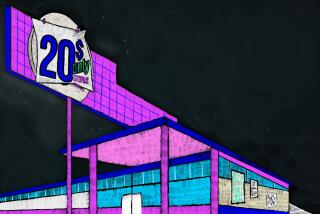Troubled Coupon Firm Stops Shipping Orders
- Share via
COSTA MESA — A troubled company that sells coupon books to PTAs, scouts and other nonprofit groups for fund-raisers says it can’t afford to ship name-brand breakfast cereal and coffee promised to thousands of consumers.
United Grocer’s Clearinghouse, in a letter mailed Wednesday to distributors, said it “felt compelled to close its doors to the public and suspend operations entirely” until a civil suit filed March 28 by the California attorney general’s office in Los Angeles County Superior Court is resolved.
A telephone hotline is advising coupon holders that UGC won’t “accept or fill any future coupon orders for coffee and cereal.” The taped message also advises UGC distributors to stop selling additional coffee and breakfast cereal coupon books to nonprofit groups.
Since opening its doors less than a year ago, Costa Mesa-based UGC and its distributors have sold about $2 million worth of coupon books, mainly to nonprofit groups throughout Southern California. Consumers who bought books through fund-raisers would then redeem coupons for cereal from Kellogg’s, Post and General Mills and a wide variety of name-brand coffees that the company was mailing from its warehouse in Costa Mesa.
But according to court documents, UGC was really operating a Ponzi scheme, using new money to pay old debts. Investigators maintain that the company has sold more than 6.3 million coupons. UGC executives dispute the number as too high, but were unable to say how many had been sold.
The state maintains that if all outstanding coupons were to be returned, the tiny company would need as much as $41 million to buy and ship products to consumers.
UGC President Steven Lee on Thursday advised UGC customers to “be patient” while the company negotiates with a “nationally recognized retailer” that might allow UGC customers to exchange their coupons for unspecified goods.
Lee also blamed the company’s decision to temporarily suspend business operations on negative consumer reaction driven by “completely erroneous news reports” about the attorney general’s lawsuit. “All of this talk of Ponzi schemes, a house of cards, fraud . . . is completely incorrect. This is not a fraud and nobody’s being ripped off.”
UGC’s rapid growth is tied to a business plan that targets nonprofit organizations that are always scrambling for new ways to raise funds.
The Irvine Education Foundation was one of the first big groups to use UGC’s coupon books when it ran a fund-raising event last fall. IEF Executive Director Elizabeth Thomas said her organization netted about $15,000 during the drive.
Officials at the Newport-Mesa Schools Foundation, buoyed by reports from IEF officials, also decided to use UGC.
“It was a fabulous fund-raiser,” said Lori Marston, grants chairwoman of the Newport-Mesa foundation. “The folks at Irvine even called us and said they’re making wonderful money, so that’s how we got started.”
“It was extremely positive and very easy to sell.”
Marston said that sales continued to do well even when early reports surfaced about slow delivery of cereal by UGC.
Word of the attorney general’s suit stunned coupon holders and officials at nonprofit organizations and schools that had used UGC coupons.
“I’m not sure what’s going on now,” said Janet Llewellyn, director of the American Child Care Center in Yorba Linda, which used UGC for a fund-raising event in late 1995. “I think we should get the cereal and coffee we were promised. But I may need to refund some money back to people depending on how many coupons they’ve used. I just don’t know.”
Fountain Valley resident Larry Lam, a Boy Scout leader whose two sons sold coupon books during a March fund-raiser, is worried that parents, neighbors and friends of the Scouts will be left holding worthless paper. “We sold about $2,000 worth, and kept about $600,” Lam said, “but now I don’t know what to expect.”
Lam said his troop’s finance director could have issued a stop order on the troop’s check to UGC but elected not to after a company official told them there was no reason for concern. “They gave us a good story on how they’d still be able to make deliveries,” Lam said.
Lee, who is also identified in court documents as Steven Lee Ickes, blamed the civil lawsuit and resulting media coverage for scaring away business partners and creating the cash shortfall that has forced UGC to stop shipments.
Lee maintains that UGC made money from advertisements that other companies paid to have mailed along with the cereal and coffee. Those companies quickly abandoned UGC when word of the suit surfaced, Lee said.
While UGC won’t be shipping any more cereal, Lee said that consumers can still exchange their coupons for other goods, including whey milk and a private label coffee blend.
While most of its sales have been in Southern California, UGC has in recent months been signing up distributors around the country. It currently has more than 230 distributors.
Deputy Atty. Gen. Albert N. Shelden said that a preliminary injunction granted by Superior Court Judge Daniel Curry prohibits UGC from selling additional distributorships.
The state’s civil suit seeks more than $4 million in restitution and fines.
“If they’ve got the cereal, there’s nothing preventing them from shipping it,” Shelden said. “If they don’t have product to ship, I’d take that as an indication that our allegations were correct.”
Times staff writer Diane Seo contributed to this story.
More to Read
Inside the business of entertainment
The Wide Shot brings you news, analysis and insights on everything from streaming wars to production — and what it all means for the future.
You may occasionally receive promotional content from the Los Angeles Times.










